Zero waste practice in Son islet and Cai Rang floating market in Can Tho city

On March 1sta delegation of the Centre for Supporting Green Development (GreenHub) , Resource Research Center and Rural Development (RECERD) and DOW Chemical Vietnam, the sponsor of the project “For A Zero Waste Mekong River – piloting circular economy in Cai Rang floating markets”, visited Can Tho city to monitor project activities to promote zero-waste practice at Son Islet and Cai Rang Floating Market, in Can Tho City.


As a dune located in the middle of the Hau River, with only 57 households, Son islet seems to be isolated from the outside world with its lush green trees. A visitor would quickly notice its cleanliness and orderliness. This is partly due to the results of the project.
The project mobilizes Son Islet households to sort and collect their waste at a fixed time weekly, and supporting a waste collector to gather hard-to-recycle waste, transfer to a waste collection point, then to the mainland for treatment. Each month, the estimated amount of waste collected is estimated at 800kg.
The project delegation also examined the “Banana Circle” models at Son islet: where the farmers compost organic waste, with technical support from the project. Some households also piloted the model of fermenting fruit peels into enzymes to produce biological hand sanitizer with positive results.


At Cai Rang floating market, the delegation also joined the waste collection boat on the river supported by the project. Because of the project, waste from most of floating rafts on Cai Rang floating market is being collected daily, minimizing littering in the river, contributing to improving the Mekong river’s environmental quality.


